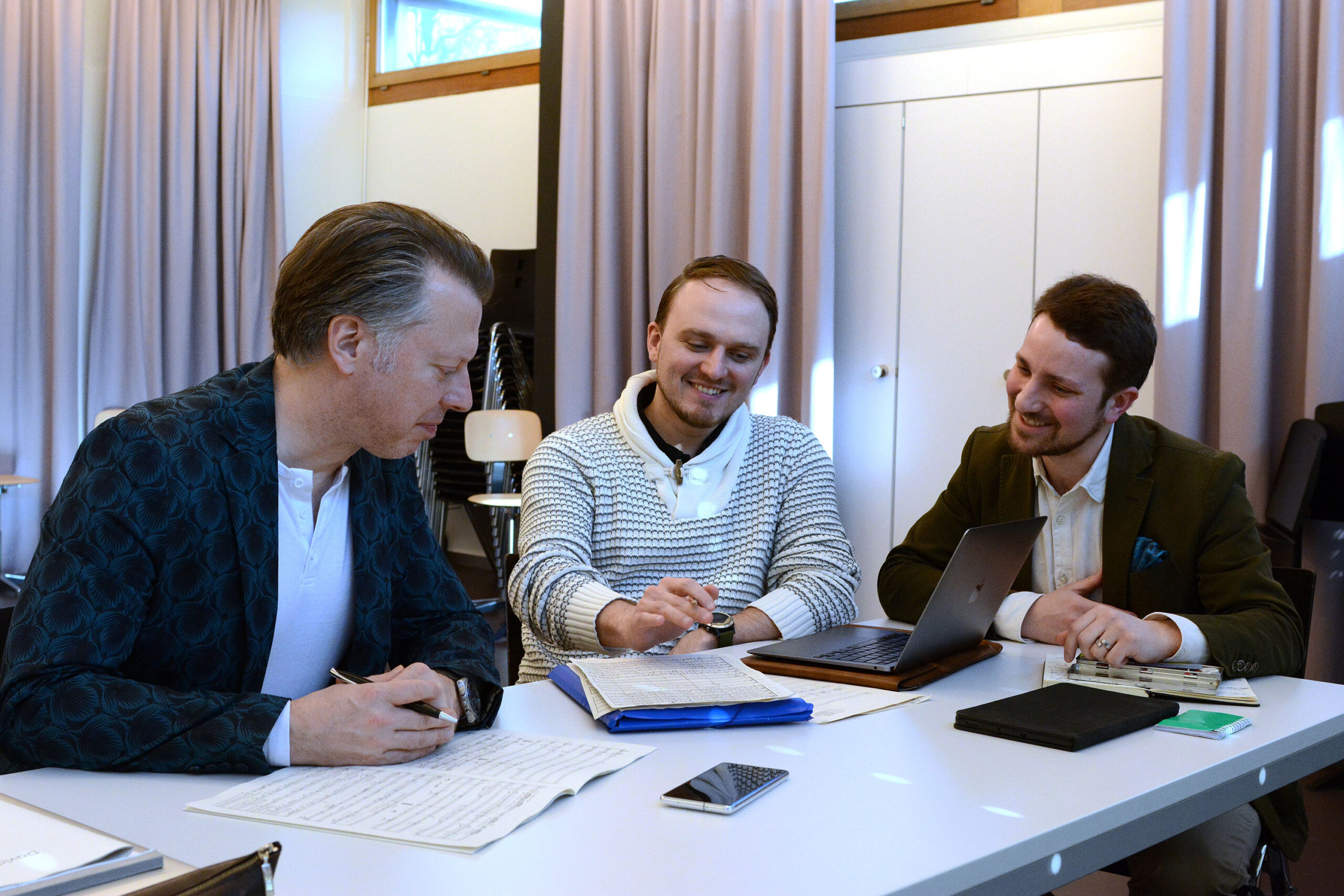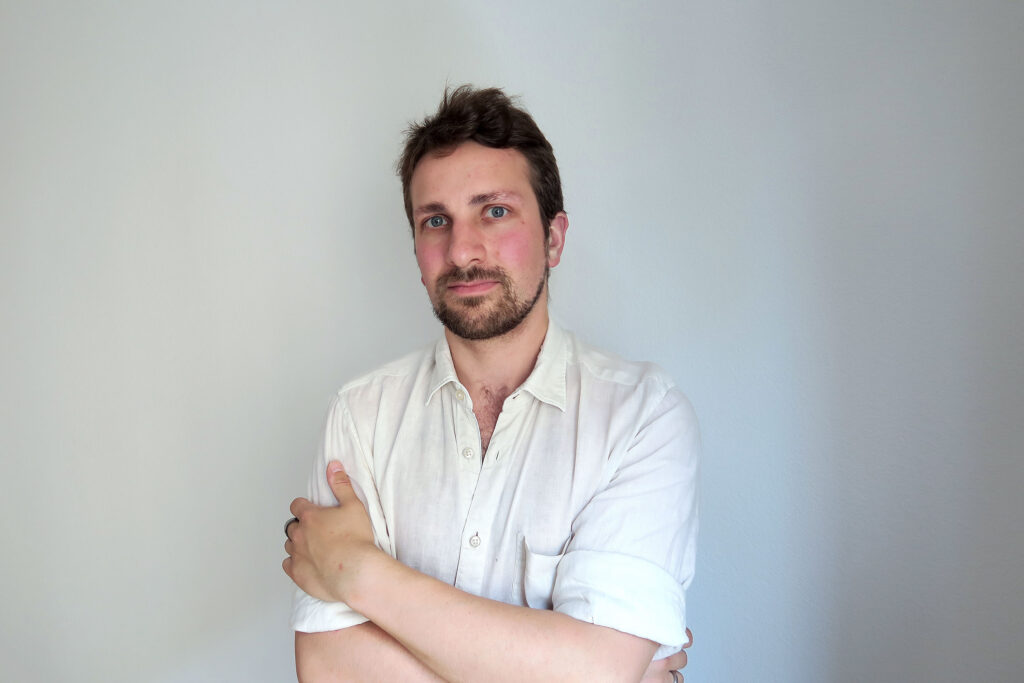As a bass-baritone, Gaudenz Werner Wigger feels at home in all sorts of musical venues and sings music from every era from the pre-Baroque to the present day, including Lied, concert and opera. He has a particular penchant for little-known pieces. He has previously paired folk songs by Brahms with Othmar Schoeck’s cycle “Das stille Leuchtenˮ (The Silent Light), and has appeared as Raphael in Haydn’s “Schöpfungˮ (The Creation). As a composer, the Aarau-born artist displays a concise musical expression in his new piece “Schwallˮ (Torrent), which is nevertheless hard to place. When asked about the tradition in which he sees his music, even he hesitates. “Over the last 30, 40 years, the range of what we understand by new music has exploded. I can’t trace back a clear line of origin for my music, although Wolfgang Rihm and Dieter Ammann have certainly played a part.ˮ This is no coincidence: Gaudenz Werner Wigger studied under Ammann. “Musique spectrale also never fails to delight and fascinate me,ˮ he adds.
For a singer-composer, it is remarkable that Gaudenz Werner Wigger has written few vocal works up until now. “For me, vocal music is so close to what I do as a singer that my standards for such compositions are much higher: I would rather not write any music than music I’m not satisfied with.ˮ He also considers instruments such as violins to be more or less the same in themselves, but given special expression through the interpretation, whereas every human voice is almost completely distinctive. “That makes things very difficult, because when you’re writing music, you can’t usually tailor it to a particular voice, otherwise no one else would be able to sing it.ˮ
Families of instruments
The theme of this year’s Murten Summer Festival is “Familyˮ, and this serves as the starting point for the commissioned compositions. It is interesting to see how Gaudenz Werner Wigger has worked this into his piece. “My music is not abstract, but I think about the music I write in a very, in fact almost completely abstract way. That made it difficult for me to link it to such a theme.ˮ This is how he came up with the idea of using the concept of the instrument family as a starting point. “For me, the instrumentation is always a central and defining element in writing a piece, so I tied the instrumentation in to the family theme. I have chosen a numerically balanced line-up of three woodwind instruments, three brass and three strings, plus two percussionists. As I see it, these are like four families that belong together.ˮ
But a new work needs more than this to blossom forth: a mood, for instance, or a melody, as a kind of nucleus. “That’s exactly what I look for at the outset: a starting point from which the piece can come into being. I often start by jotting down some notes on paper, such as the instruments available and their underlying characteristics. What are their lowest notes? What are the open strings for the string instruments? What are the overtones? I’ll just write it all down and maybe something will spark an idea.ˮ
This opens up a range of possibilities, and Gaudenz Werner Wigger begins to compose, often switching to the computer or the electric piano. “This phase is very intuitive. I cast around for and try out a lot of things. So far, I’ve always been lucky enough to find something from which I can develop music that I like in every aspect.ˮ This is precisely how his new piece, “Schwall’, came into being. “At first, I came up with about 30 seconds. I picked out the end of this, which became the core of the piece; the rest of those original 30 seconds is nowhere to be found in the piece.ˮ
In “Schwallˮ, a quintuplet and a gong stand out, appearing repeatedly. “In fact, this very quintuplet formed the starting point for the composition, which I arrived at indirectly – how, I don’t remember, but that’s how the whole piece came about. The gong, on the other hand, was added later, but it is definitely a defining element, as I’ve used it at key points.ˮ Once he had established the quintuplet as the starting point, he simply began writing. “If I wait for inspiration to strike, then I miss out on life – or at least my deadline; I have to fight the blank sheet of paper before me, so to speak.ˮ
Creating clarity
When writing spontaneously, there is always a risk of overdoing things. “The quintuplet in particular was much more complex in my first draft,ˮ says Gaudenz Werner Wigger. “I simplified certain aspects of it in order to make other elements of the composition more prominent. What’s more, if I write a lot and then come back to it the next day or the day after, I often find that there’s too much going on. I then rework the music with the aim of keeping it complex but making it less complicated. For example, in one part of the piece I focus on the rhythm, in another part on the fast runs.ˮ
This also means finding a kind of common thread for the piece. “I mean this less in a tonal sense than in terms of form. There are certainly breaks, and there can be surprises. But it’s important to have a thread running through it, so that there’s a constant logic to it, even though as a composer you could go in any direction at any point. You could call it stringency.ˮ Does this also mean that the rhythms are often quite demanding, especially since there are also many time signature changes? “This isn’t a preeminent rhythmic concept, but something that emerged of its own accord. Essentially, my music arises from within.ˮ

Gaudenz Werner Wigger was mentored by renowned Swiss composer David Philip Hefti for this commissioned composition, as was the other funded composer, Andrzej Ojczenasz. The three composers met for the first time at the beginning of January, even before the ensemble line-up and theme were known. Afterwards, they met once or twice a month, always as a three, sometimes via Zoom. “Andrzej and I showed how far we had got, mostly using the Dorico program. We started with sketches, which gradually evolved into a piece. We also discussed our works in progress freely.ˮ
The challenge of interpretation
Gaudenz Werner Wigger recalls that David Philip Hefti’s involvement in the composition process was not particularly hands-on. Simply put, it was good to have someone else – and someone with enormous experience – look at his work. “Philip and Andrzej came up with ideas that I wouldn’t have thought of myself because I was too close to my drafts. I was able to adopt some of their ideas. The great thing about our exchange was that Andrzej and I felt very free. Philip didn’t dictate anything to us at all.ˮ They were given more suggestions than concrete ideas; the only specific pointers were about things like instrumentation.
Transforming a rhythmically demanding composition into a performed, interpreted piece is a major challenge. This makes the special instructions in the score all the more striking, such as the note at the end of the piece that musicians should “repeat with varying speeds and durationsˮ – in other words, giving them the freedom to play around with the piece. “That passage is like a little break from the strongly rhythmic music. It makes a nice contrast and offers the chance for a bit of showmanship – which is no bad thing. After that, the rest of the piece is very tight and rhythmic again, with little rhythmic leeway, as before.ˮ
“SUISA en scène” at the 2025 Murten Classics Summer Festival
It is a well-known fact that young composers barely receive any recognition. They miss out on commissions for compositions and a platform on which they can present their work to a wider public. SUISA and the Murten Classics Summer Festival have therefore launched the joint project “SUISA en scène”, which aims to discover talented musicians, support their further development and connect them with other musicians.
Christoph-Mathias Mueller, artistic director of Murten Classics, and David Philip Hefti, composer mentor, selected two young composers for the project, each of whom was able to create a commissioned work lasting no more than eight minutes in the first half of 2025. The pieces created during this coaching process – “Schwall” by Gaudenz Werner Wigger and “Vicious Circle” by Andrzej Ojczenasz – will now premiere at this year’s Murten Classics Summer Festival. Tonflug, the student ensemble of the Zurich University of the Arts (ZHdK), and Thaïs Louvert (violin) will perform these pieces alongside compositions by David Philip Hefti (“Éclairs” and “Wunderhorn-Musik”) and Rudolf Kelterborn (“Erinnerungen an Mlle Jeunehomme”). These works will be conducted by Mario Garcia Ramos, Jeanne Cousin and Leonhard Kreutzmann, who have already developed the programme as part of a master course in interpretation at the ZHdK under the guidance of Christoph-Mathias Mueller.
24 August 2025, Deutsche Kirche Murten, 5 pm. David Philip Hefti and Christoph-Mathias Mueller will provide commentary during the concert.
A public workshop rehearsal will take place at 2 pm on 23 August 2025; admission is free.
Tickets and further information: www.murtenclassics.ch




